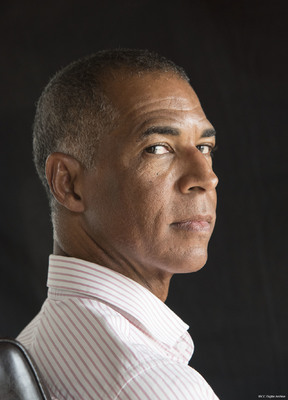Interview with Eddy Smythe. Two
Title
Interview with Eddy Smythe. Two
Description
Eddy Smythe reminisces about his father, John Henry Smythe, who was from Sierra Leone and served in Bomber Command during the Second World War. John flew as a navigator until his aircraft was shot down in November 1943. He became a prisoner of war in Stalag Luft 1 until 1945. After his release John went to London and trained as a barrister. Upon completion of his professional training, he returned to Freetown, Sierra Leone and set up a legal practice. He rose to be Sierra Leone’s Attorney General. One evening, he met the German Ambassador at a reception. They realised they were aircrew on opposing sides, and the Ambassador shot down an aircraft on the same date and time and in the same location that John’s aircraft had been shot down. This prompted the two men to hug each other and to note that the conditions of war meant that such aggressive acts were not personal. Eddy adds final remarks on the value of remembrance and reconciliation.
This content is available as embedded video:
Creator
Date
2017-08-02
Language
Type
Format
00:04:04 video recording
Publisher
Rights
This content is available under a CC BY-NC 4.0 International license (Creative Commons Attribution-NonCommercial 4.0). It has been published ‘as is’ and may contain inaccuracies or culturally inappropriate references that do not necessarily reflect the official policy or position of the University of Lincoln or the International Bomber Command Centre. For more information, visit https://creativecommons.org/licenses/by-nc/4.0/ and https://ibccdigitalarchive.lincoln.ac.uk/omeka/legal.
Contributor
Identifier
PSmytheE1701
Transcription
Good afternoon. My name is Eddy Smythe. My father was John Smythe. He was a Sierra Leonian who came over from Sierra Leone to join the RAF in 1941. At that time Sierra Leone was part of the British Commonwealth and he had absolutely no hesitation in volunteering to join the war effort to fight for his country and to fight for his Queen. He saw service for two and a half years. He was shot down and was a prisoner of war for two years. When he was finally released he went back to London and he studied to become a barrister. He qualified and went back to Sierra Leone and set up a legal practice there. He went on to act for most of the embassies in Freetown at that time being as his firm was one of the largest practises at that particular time and he quite often attended cocktail parties and various other functions held by these embassies, most notably the British Embassy. And there was one particular occasion when he was at a party and ended up chatting to the German Ambassador. They both established that they were in their respective Air Forces during the war. My father was in Bomber Command and the German Ambassador was in Fighter Command. So they chatted for quite a while and they shared various stories and my father said his flying came to an end when his plane was shot down over Germany on a particular day, a particular month and a particular year. And the German Ambassador went silent and he said, ‘Can you tell me the exact date again and the exact time?’ Which my father did, and he said, ‘Can you tell me exactly where the plane was shot down? Are you able to tell me the coordinates?’ And of course, my father did. You know, he’d never forget those sort of details. And at this point there was silence and the German Ambassador paled visibly and he said, ‘You’re not going to believe this but at that exact time I was flying in that location and I shot down a British bomber and it is logged as a kill to me.’ And my dad said they both looked at each other. They were both speechless for a few seconds and they threw their arms around each other, hugged each other, went off and had a drink and celebrated the event. When he told me this story I was much younger and of course and I thought, ‘Well, how could you react like that? Surely you were cross being shot down.’ He said, ‘No. Not at all. He did what he had to do. I did what I had to do.’ He said, ‘We actually celebrated the circumstance.’ So, as I said I could have told you a few stories but that’s one which I think is quite a nice story to tell and I am really pleased to have the opportunity to tell the story. Its not very often that I can do and I think it is important that the story is told because it helps to demonstrate the significant effort that was made by people like me dad from all over the Commonwealth towards the war effort. So thank you very much.
Collection
Citation
Heather Hughes, “Interview with Eddy Smythe. Two,” IBCC Digital Archive, accessed July 27, 2024, https://ibccdigitalarchive.lincoln.ac.uk/omeka/collections/document/8776.
Item Relations
| Item: Interview with Eddy Smythe. Two | dcterms:relation | This Item |

